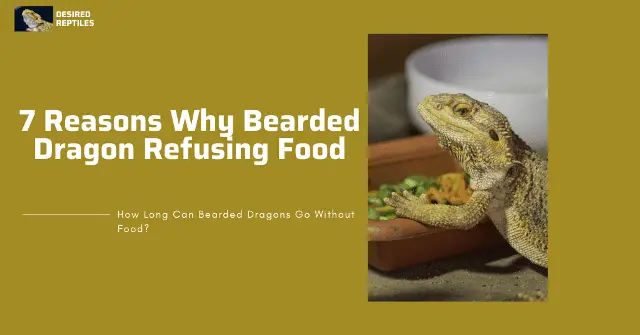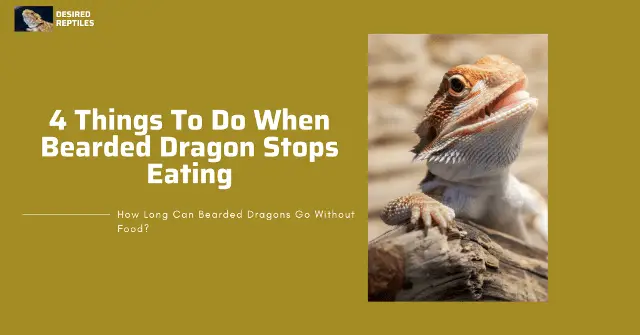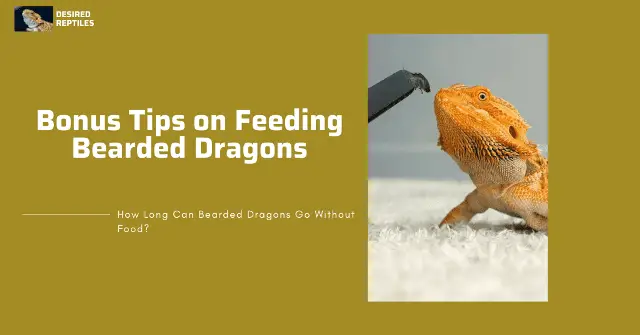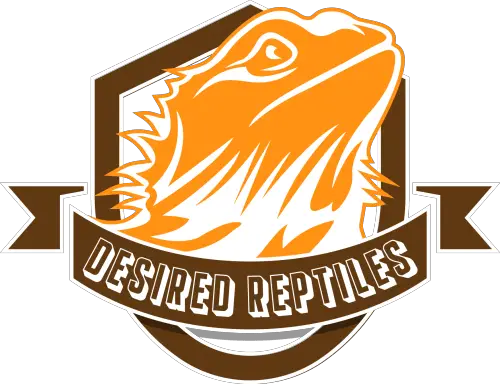When my first bearded dragon went days without eating, I lost my mind trying to figure out the problem. I was desperate to give him more years to live before he kicked his bucket as he was elderly, only for him to quit eating immediately after I got him settled in! After a few vet visits and pestering beardie owners on social media for answers or any possible assistance, I found out that he was just adjusting to his new home. It’s normal for bearded dragons to abstain from food due to a change of environment, an underlying illness, or a mating ritual.
His appetite improved a few days later and he was back to ordinary! However, loss of appetite could mean different things, so it’s crucial to know the context to ensure your pet is not in danger.
Bearded dragons can go from a week to three months without food. This could either be due to an illness, stress, or a period called ‘brumation’, similar to hibernation. Without brumation in the picture, beardies could only last within two weeks before they die; I’d give the juvenile dragons 5 days to one week of starvation for all hell to break loose.
It is easy to imagine the worst cases when your beardie declines food, but the best thing to do is to stay calm, study its behavior, and seek professional advice for a diagnosis if it prolongs. Read on!
How Do Beardies Survive Without Food? Your Pet’s Journey During Starvation
Bearded dragons are built with a higher hunger tolerance in comparison to humans—well, at least the adults are—so they can go a day or two without being fed. It wouldn’t be fun for them, but it’s nothing they aren’t wired to withstand. In the wild, there is no feeding schedule for bearded dragons to follow; they eat when they’re lucky, which could be a few bugs in a day or two. So, when met with scarcity, they preserve energy by drastically slowing down their metabolism and effectively reducing activity to raise their chances of survival.
However, baby dragons and juveniles depend on daily food supplies to build up their muscles and fats which are essential for retaining heat and moisture. On the third day of starvation, a juvenile beardie will be significantly weakened and could even die from the lack of food as opposed to adults who may exceed a week.
If your bearded dragon has gone missing, and you wonder how long it can cope without food, the duration will be relatively shorter due to the amount of stress it could be under, especially since it is already living outside its arid enclosure. Adults have higher tolerance since they don’t eat half as much as youngsters, but if your pet has been habituated to a pattern all its life, breaking its feeding routine will drastically flip its ordinary lifestyle and cause stress. In case you’re traveling for a few days, it’s advisable to get a trustworthy person to fill in for you instead of subjecting your pet to starving until you return.

7 Reasons Why Your Bearded Dragon Is Refusing To Eat
Food is essential for every breathing and kicking being. If your beardie suddenly refuses to eat, something is surely off. Here are 7 accurate reasons why your dragon is force-fasting:
1. Your Beardie Is In Brumation
Brumation is a period where beardies are entirely in a hibernation-like state. During this period, they try to preserve fat, muscles, and water by sleeping through days upon days that could extend to months. In this period, they’ll eat 90% – 100% less and excrete just as much.
To distinguish whether your pet is entering brumation or suffering from an illness, seek tell-tale signs such as sleeping earlier than usual, pooping less, keeping to themselves more, taking longer naps than usual, and of course, eating much less. If your beardie displays all of these signs, it’s probably entering brumation. If otherwise it looks sickly and discolored with signs of a blackened beard, it’s most likely ill and in need of a professional inspection for a diagnosis.
2. You’ve Changed Your Pet’s Diet
While bearded dragons are not picky eaters, they certainly love a routine, and some of them may be stubborn enough to reduce their food intake or refuse to eat entirely to get their way. If you’re changing your pet’s diet for the better, try acclimating or tricking it into feeding by mixing its favorite food with the new meal item.
For instance, if it’s sworn to consume only bugs, perhaps you should make a mixture of bugs and greens so that both are eaten in the process. If the food pickiness persists, you may pay a visit to the vet or breeder for a more constructive and specialized solution. They always know what to do!
3. Lack Of Enticing Food Options
Bearded dragons may prefer something new, as contradictory as that sounds. Perhaps you’ve been feeding your pet one type of protein or veggie and it just wants something else to eat. Try switching to a different worm or perhaps add some fruits this time. Your pet may have gotten bored with his routines and is seeking more mental stimulation.
4. A Difference In Temperature
Beardies are ridiculously sensitive to temperature. A slight difference in what they’re used to can disturb their eating habits and cause them to starve. There’s a greater chance of this occurring if the temperatures get colder than what they’re familiar with.
5. Your Dragon May Be Stressed
Stress is a normal occurrence for animals and beardies in particular. Loud noises or too much disturbance around their tanks could frighten them and cause them to lose their appetite. Seeing as bearded dragons are quite particular about their environment, certain details are a requisite for them to be in check and function properly. Ensure that you don’t have any source of loud noise around your pet’s enclosure so that it doesn’t feel too stressed and later fall ill from it.
6. There Is An Underlying Illness
Lack of appetite is a generic symptom of an illness. So, if your dragon suddenly rejects its favorite meal, there could be an underlying health issue. Illnesses like metabolic bone disease, constipation, vitamin deficiencies, and even parasites could cause your pet to lose appetite. The best thing to do in this case is to seek medical help as soon as possible, to contain the problem before it escalates.
7. Your Pet May Be Injured
Injuries are quite common for beardies. Remember they crawl against the floor, rocks, or coarse surfaces and could easily scratch or scrape their bodies in the process, or develop an oral sore. If it becomes bothersome, they might lose their appetite and become slower or less responsive.

Immediate Actions To Take When Your Beardie Stops Eating
The first thing to do is stay calm. Panicking and imagining the worst can lead you to either stress your pet even more or make rash decisions that may not be beneficial for either of you. Here are 4 rapid things to do if your dragon stops eating:
Inspect The Environment
The enclosure determines if your dragon will be happy or not, and if there’s a problem, the best thing to do is check out the enclosure. Make sure the light exposure, temperature, humidity, and effects of the surroundings are accurate. If you have visitors who like to fawn and coo around the enclosure admiring your beautiful pet, then you might want to consider keeping it out of sight to properly monitor the situation.
Change The Dragon’s Diet
Your bearded dragon may not enjoy the options it’s being fed, and would rather eat something else. It wouldn’t hurt to try other choices, perhaps a different type of worm or insect or veggie option.
Also, try feeding it live bugs if you haven’t been doing so. Bearded dragons love to see their food wiggle with life before they eat. It’s possible that they just need a little push to feed.
Force Feed Your Beardie (With Care)
You might be wondering how to successfully feed a dragon without bringing the sky down and hurting your pet. In all honesty, it’s quite a hassle, but possible. All you need is a paste or smoothie blend of high-protein worms and mineral-rich veggies, a clean syringe, and your hands.
How to do it:
Apply slight pressure at the ends of their mouth for them to open up, and insert the syringe through the side of the mouth to the back of the throat. As you angle the tip of the syringe downward toward the throat, slowly depress the content into your dragon’s mouth. Ensure the pace is regulated to prevent choking.
Bear in mind that this should not be a regular occurrence. Bearded dragons are not meant to be syringe-fed like kittens, and if it has gotten to this, it’s surely time to book an appointment with the vet.
Visit The Vet
Seeking professional help is the best choice to make if your dragon ceases to eat. Your veterinary doctor will tell you every possible reason depending on the morph, species, or age of your dragon, and what to do about it.
Please, do not delay your vet visit if your beardie has not eaten for more than three days and if you are unsure of what brumation looks like. The symptoms of a terrible sickness are quite similar to brumation, and in this case, it’s best not to take chances if you’re not an expert.

2 Effective Tips On Feeding Your Bearded Dragon
Gut-Load Feeder Worms With Fruit For Extra Vitamins
If your bearded dragon has refused to eat fruits and consume the necessary vitamins to keep it healthy, feed a slice of fruit to the live worms before feeding the fruit-packed worms to the beardie. They wouldn’t suspect a thing and would finally get the vitamins they’ve been running away from!
Use Spray Bottles To Hydrate Your Beardies
Getting a spray bottle works like magic! Instead of putting an unattractive water bowl in their enclosure, give a few spritzes on their veggies before they eat and a few on their heads. They will either eat the veggies with a sufficient amount of water for their little bodies or lick off the water from their heads.
Oftentimes, People Ask:
How long can bearded dragons go without water?
Beardies can survive up to 2 weeks without a water source. Their natural habitat features little water, and the dragons have evolved perfectly to work with it.
Did you know that they can absorb water through their skin to hydrate themselves? Usually, dragons survive off the little water they find in veggies or mildew. This is why it’s important to feed your bearded dragon a balanced diet of protein and vegetables.
What are the appropriate schedules for feeding your bearded dragon?
For babies under 3 months, aim to feed them 5 times a day. Babies 3-6 months should be fed 3-4 times a day, while those over six months old should be fed thrice a day to twice a day as they age.
How important is a feeding schedule?
It is very essential to establish a routine feeding schedule for both your dragon and yourself. This will help to train your beardie to know when it’s time to eat and help to get you into the routine of daily multiple feedings. It’s more effective to establish feeding routines as soon as you get your bearded dragon. A little research and consultation with a professional should suffice to wade you through the mysteries of how your dragon’s appetite works.
In what season is brumation likely to occur?
It is very common for you to notice signs of brumation in the late fall, just before winter (October, November). But for some bearded dragons, brumation starts around June, when it’s winter in Australia, their native habitat.
Generally, the timing for brumation depends on the individual dragon, seeing as several factors are considered before this course of action is taken. An interesting rule of thumb is to pay attention to the change in weather, from heat to cold. This, accompanied by other cues can indicate that your beardie is about to take a long deep nap!
